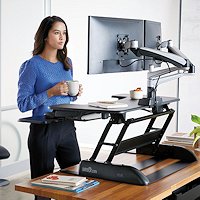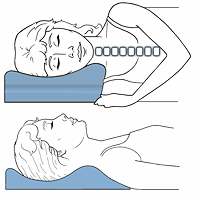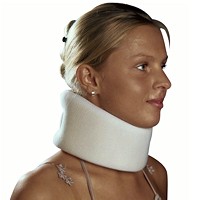It Is Posture Month & We have Some Help
Correct posture not only encourages everyone to think about posture, but also how it affects overall health. This happens all the time and in every position. Posture month is a great way to start correcting.
Since we are so sedentary, it is important to know about ergonomics and this is a great time to check out some simple suggestions. With so much emphasis placed on sitting, playing video games, using a computers and phones, posture is more important than ever.
Activities like lifting often cause injuries, so knowing the basics of safe lifting is important, not only for your back, but your neck as well. This can help with everyday activities like gardening or bending and cleaning. Especially kids with backpacks and cell phones.
 Ergonomic Aids Ergonomic Aids |
 Cervical Pillows Cervical Pillows |
 Neck Support Collars Neck Support Collars |
Poor posture can impact a persons health in many ways. Back problems are usually thought about, like back strain and even disc herniations of the lumbar spine, but neck strains and disc bulges can also happen. Long term, it can lead to degenerative arthritis. Often, treatment using medications can have negative side effects and damage internal organs.

Think about the mental aspects as well. When you have good posture, you look better and move better and this can have a huge impact on how you feel about yourself. So, posture month helps you feel and look better.
Slouching postures can cause jaw pain and even headaches. Altered postures strain muscles, joints, ligaments, and tendons, which can lead to degenerative disc disease, impaired breathing and even digestive and circulatory problems.
While we can’t have perfect back and neck posture all the time, a little knowledge and awareness can really help. Also, professionals like chiropractors and physical therapists that can help in diagnosis and treatment.
Posture Month Tips
There are what we call posture first aid suggestions, but, in general when standing, keep the head up and avoid a head forward posture, shoulders comfortably back and stomach in. When sitting, legs should be bent bent 90 – 120 degrees and perpendicular to the floor. The buttocks should touch the back of the chair backrest and weight evenly distributed.
Avoid sitting for extended periods; take short break every 30 minutes or so. Stay hydrated, keeping water close and drink frequently. Regular toilet trips are natures way of letting you know to get up for a bit.
When sleeping, use ergonomic pillows that help maintain a neutral posture to avoid strain on the musculoskeletal system. Avoid stomach sleeping. The use of functional pillows can help.
Maintaining the correct spinal curves always helps when resting or doing any activity and non-straining exercises can help like yoga to help keep balanced muscles, alignment and balance.
Remember for posture month, good posture can:
- Give you up to 3 inches of additional natural body height
- Prevent fatigue by using muscles more efficiently and expending less energy
- Prevention strains, aches and pains
- Reduce wear and tear on joints and ligaments
- Help with arthritis, circulation and digestion
- Improve appearance and mental health
- A 2018 study in BMC Musculoskeletal Disorders indicated poor postural patterns are associated with musculoskeletal pain and improving a posture awareness is necessary to show clinical improvements. The authors concluded, “Postural awareness is associated with pain intensity, physical and mental impairments in patients with chronic pain; and improvements in postural awareness through multimodal interventions were associated with improvements in pain intensity.”
